#Italian court ruling
Explore tagged Tumblr posts
Text
EXY RULES AND REGULATIONS
Hi. I recently got the italian edition of AFTG and I found three pages of exy rules and regulations at the start. Nothing that isn't already on the site (exy wiki), but I found this version to be waaay clearer and well organized.
So here is a messy translation. Many things are taken directly from the site; feel free to add to this and to correct me where I said something wrong.

Basic knowledge
An Exy game is played in two forty-five minute halves with a fifteen minute halftime break. An Exy court is 60 yards wide x 100 yards long x 10 yards tall. It is completely enclosed by half-inch thick plexiglass walls and roof, primarily made for rebounds and passing, but also to protect the audience from being hit by the ball. Both home and away have doors to allow players on and off the court. When the ball is in play, these doors must closed.
The court is divided into fourths by three equidistant lines: first-court, near the home goal, half-court, and far-court, near the away goal. Penalty shots are taken from marked spots halfway between first/far-court and the half-court goal (note: on the exy wiki it says that penalty shots are taken halfway between first/far-court and the home/away goal. I should probably check the books to determine witch one is right, but I don't have it in me rn. Please let me know if you find the correct version).
The Exy goals are on either end of the court. The actual goal is a 3x7 yard section on the wall, outlined by a bold line. The goalkeeper's territory is the 3x7 area directly in front of the goal, also marked by a line. Players are not allowed to cross the goal line. The boxed-in area of the goal wall is laden with sensors. Each goal counts as one point. When a ball strikes inside the goal, the wall lights up red. If ball that hits the goal's border, it doesn't count as a goal. The game's objective is to score more points then the opposing team.
–––––––––

Teams/Positions
There are four positions: striker, dealer, backliner, and goalkeeper. The striker is offense and plays to score. Strikers start the game on the half-court line; the strikers on the serving team start on the inside, strikers for the defending team are on the outside. The dealer serves and is thereafter the middleman; dealers have the option to specialize as offense or defense and can play as an extra striker or extra backliner depending on how the game is going. Dealers start on the first/far-court lines. The backliner is defense and protects the goal. Backliners start on the first/far-court lines. The goalkeeper guards the goal.
Six players per team are allowed on the court at a time. Generally speaking, this allows for two strikers, a dealer, two backliners, and the goalkeeper. The goalkeeper is optional; the coach may sacrifice the goalkeeper for an extra player under certain circumstances. The minimum size for an NCAA team is currently nine players, so that there can be six on-court players and a sub for each position - save the goalkeeper. After recent events this rule is under review and posited to increase to twelve.
–––––––––

Equipment
Racquet: Net depth varies by position. Dealers have the deepest nets so they can more easily carry the ball between offense and defense. Striker racquets are a bit shallower, still allowing them time to line up a perfect shot. Backliner racquets have just a little give, as backliners are strongly discouraged from carrying the ball; the longer a ball is near the goal the higher the chance an opposing striker can take possession of it. Goalkeeper racquets are flat. They are also the largest of the racquets, with a head that measures 1.5x2 feet. Goalkeeper racquets are also the longest allowed on court, with a shaft that tops out at 4 feet. Racquets for every other position have a range of 30-45 inches based on player height and preference. Racquet weights are also negotiable, as are the materials allowed in the construction. Generally speaking, offense racquets are made of aluminum (for lighter carry and more control), and heavy defense racquets are made of wood (for more power and force in challenges).
Ball: Roughly the size of a fist and weighted for rebounds.
Helmet: Required to be worn on the court at all times unless instructed otherwise by an official or unless the game is not in session. A visor goes in front of the eyes to allow a protected but unobstructed view of the court; grating protects the face from the nose down.
Armor: Chest and shoulder padding, neck guard, shin guards, arm guards, and armored gloves to protect the players' fingers. Optional: bandannas to keep hair out of one's face, armor to wear over one's thighs under one's shorts, and mouth guards (to prevent accidental injury during collisions)
–––––––––

Some fundamental rules
Off-sides is in effect on Exy courts. Meaning: an offense player who does not have possession of the ball, or who is moving to take possession of the ball, must have an opposing defense player between him or herself and the opposing goalkeeper at all times. This prevents strikers from waiting near the goal to score. The penalty for off-sides is loss of possession and a reset to the half-court line.
Body checks are allowed against players who have reasonable possession of the ball: that is, who currently have it, who have just relinquished it, or who are within a moment of receiving it. The player who currently has possession of the ball may body-check any other player with no restrictions. A faulty body check results in loss of possession and a reset to the next-closest court line.
Any other form of fighting is prohibited and will result in a card. The severity decides whether the card is yellow or red; it also determines whether a team deserves a penalty shot or a simple loss in possession. Games are restarted from where play was halted; the exact spot will be decided on by the residing referee. No other player may stand within ten feet of the dealer during a mid-play serve.
"Stick checks" are allowed only between racquets. A player who strikes another player's body with his or her racquet will be carded and the opposing team will receive a penalty shot. This includes using one's racquet to trip another player. A stick check against another player's helmet is an immediate red card and earns the wounded team a penalty shot on goal.
Balls may only be carried for 10 steps, at which point they must be passed. Acceptable passes are to a teammate, to oneself via a rebound, or a shot on goal.
One yellow card is a warning. Two result in the player sitting out the remainder of the game. A player who is red-carded is immediately expelled from the ongoing game and must sit out of the next one as well.
Exy games for youths and high schoolers require four referees at minimum. From the NCAA level upward six are required, three to either side of the court.
Goalkeepers are the only players allowed to touch the ball with their hands. Players cannot catch, kick, or otherwise interfere with the ball unless using their racquets. Violation of this is a stop-play and switch of possession.
#aftg#all for the game#the foxhole court#tsc#the sunshine court#exy#exy rules#exy rules and regulations#aftg italian edition
8 notes
·
View notes
Text
"We need more evil women in fiction"
You guys can't even accept a morally grey female historical figure without trying to whitewash her into a clueless naive idiot led astray by evil men
#Was listening to one historian who shows up on different documentaries a lot and she voiced an absolute doozy of a claim that Catherine#De Medici had nothing to do with the St.Bartholomew's Massacre#Girl what#Are you shilling for an extinct family of Italian bankers or what#Girl just cause she didn't specifically order a religious genocide in these exact modern terms she made those dumb decisions#That's kinda on her#You can't go this girlboss de facto ruled the country except for that one time when a really fucked up thing happened she was on her 15#Same for Lady Rochford#What a coincidink that she just kept finding herself in the centre of all the juciest court scandals despite being a pure cinnamon roll#Come ooooooon
1 note
·
View note
Text
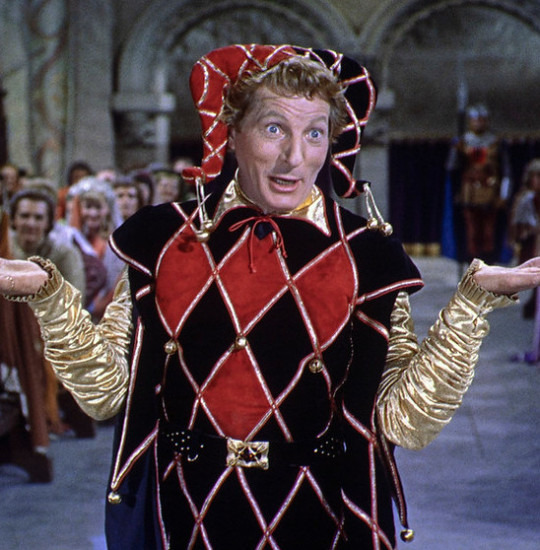
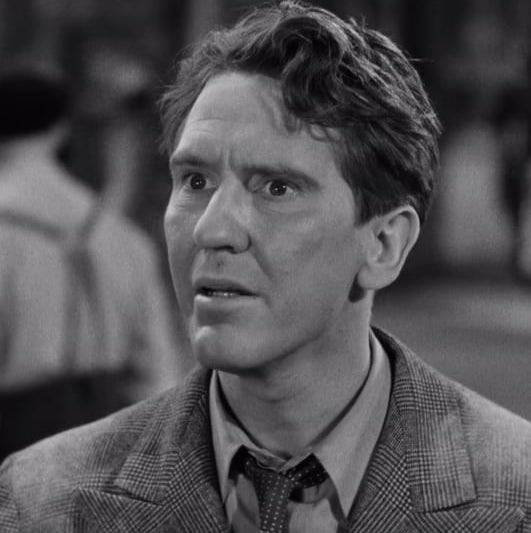
Danny Kaye (The Court Jester, The Inspector General)—Danny Kaye, idol of my childhood, maker of the weirdest faces! This man SETS HIMSELF ON FIRE and then puts himself out in a bucket in a movie based on a Gogol short story. In the same movie (Inspector General), he flirts by playing a carrot as a musical instrument. In Wonder Man, he's brilliant but struggles with things like riding buses. I have been envious of his fake Italian/French/German/Spanish monologues in The Court Jester for the past three decades. As Walter Mitty, he is SUPREMELY SILLY yet also somehow manages to be a comic foil for none other than Boris Karloff. All this is to say nothing of The William Tell Song (TV, thus not linked, but great.) I adore him.
Burgess Meredith (Of Mice and Men, That Uncertain Feeling, Second Chorus)—I first saw him in Idiot's Delight. He was standing next to Clark Gable on a balcony. I didn't even notice Gable was there, Meredith's scrungle game was too strong. -5'5 1/2 (1.66m) -He is THE weirdest little freak in That Uncertain Feeling, Merle Oberon picks him up in a psychiatrist's lobby. He's a concert pianist but he hates that people pay to hear him play, he can't stand them watching him. Vases offend him. He sees himself in an abstract painting. He's an absolutely chaotic gremlin and I love him SO much -He plays PENGUIN in the old Batman series!! What's scrunglier than that?! -"Was fascinated by the subject of non-human intelligence, particularly dolphins. He once believed that a dolphin somehow called to him for help in the middle of the night while he was staying at a friend's home on the beach. He ran out and found the dolphin, caught in a net under a dock down the beach, although there was no way he should have been able to know it was there. He released it, saving its life. He believed it had made some sort of connection with him, perhaps telepathic, to call for help." [IMDb] -He will forever be my favourite portrayal of George from Of Mice and Men, his speech about "seeds" and dreaming about a farm of his own wrecked me -In Tom, Dick and Harry, he's one of three suitors courting Ginger Rogers. It's zany and ridiculous, an absolute rollercoaster. He teachers to bowl with his sleeves rolled up. He drives a 3-wheeled motorcycle -He's in a MUSICAL with FRED ASTAIRE they're romantic rivals for PAULETTE GODDARD. He also wears a bucket hat. (Second Chorus) -His hair is VERY floofy in his early roles, I think that should be taken into consideration 4:54: [link to whole movie, editor has not watched it + can't vet but confirmed his hair is fluffy for the minute she did watch]
This is round 1 of the contest. All other polls in this bracket can be found here. If you're confused on what a scrungle is, or any of the rules of the contest, click here. Reminder that this is a movie poll, not a TV poll, in case any of you were flocking to any bird-brained ideas.
[additional submitted propaganda + scrungly videos under the cut]
Danny Kaye:
He's so stupid. I love him.
youtube
Burgess Meredith:
Look at his face! He looks like a little field mouse, and a field mouse is scrungly. Admittedly I know him more from the Twilight Zone, in which he reached levels of peak scrungle, but I believe he deserves a place on this list.

149 notes
·
View notes
Text
The monsters and their ability to pick up languages is so interesting to me so here’s some random HCs about monsters + languages that are definitely not original at all:
- Neil learned French in Europe before him and Mary found their way to French-speaking Canada. He essentially had to semi-adopt the language discrepancies while he was there, and even though his fluency is in French from France, sometimes he messes up and pronounces things weirdly or differently (and Kevin frequently makes fun of him for it)
- Kevin has some rusty Japanese that he was forced to learn growing up. He can understand it pretty well, and can somewhat speak it to a lower level, but he can’t read or write it. He’s not fluent, and probably couldn’t hold a conversation with a native speaker, but he could understand his Japanese counterparts in the Nest when he needed to.
- In turn Kevin isn’t able to order in Japanese at a restaurant, but he could explain the rules of Exy to someone fairly coherently if he had to.
- This isn’t an original thought by any means but Neil and Kevin definitely speak in French when they’re by themselves just to make sure they don’t lose it.
- They sometimes make calls to each other on the court in French, and because of this, most of the team picks up very basic calls in French. None of them can actually speak it, but Andrew picks up a little more than the rest, having spent so much time with Kevin. Again, couldn’t hold a conversation, but every now and again he recognises certain words in their conversations.
- Neil is like a walking version of those White Guy Speaks Chinese And Stuns Waitress (he can understand her?!?) polyglot youTube videos. It becomes more of a hobby for him once he’s settled and the FBI are off his back, but the foxes are constantly shocked by how many languages he can speak. He is fluent in English, French, and German of course, with some conversational Spanish, but he can pretty much have a basic interaction in most of the languages of countries he’d been in. His Dutch is the worst, because he could never quite grasp the proper pronunciation of things, but one time he speaks to a waiter in Italian and Andrew can’t believe it.
- (RIP Neil Josten, you would’ve loved duolingo)
- When he goes to the Olympics he’s like a kid in a candy store. It’s like a subconscious bingo game for him to speak to someone from every country at least once.
- Aaron loves listening to music in German. He would definitely drag Nicky to a rave if they ever found themselves in Berlin.
- Katelyn asks him whenever they have their kid if he wants to raise them bilingual, but he decides not to because he only really learned German for Nicky and his brother, and doesn’t really speak it at all after he graduates.
- Neil and Nicky study Spanish together sometimes. It helps Nicky stay close to his roots now that his immediate family is pretty much out of the picture. It means way more to him than Neil even knows.
- Another unoriginal one but Andrew and Neil definitely do learn sign language in the future. I could talk about this one forever.
- When Kevin gets frustrated, he finds it hard to speak ANY language. He messes up words in English, forgets how to say things, and occasionally is the butt of the joke when he combines a French and English word accidentally.
- Kevin watches anime when nobody is around. He thinks dubbed anime is a crime.
- Andrew thinks he’s pretty good at German until he tries to have a conversation with Erik and realises wow native speakers talk a lot faster than we do. You wouldn’t know, because even if he just understands half of a sentence, he can usually piece together what is being said 90% of the time, and he would never admit out loud that he needs Erik to slow down when he’s talking so he can understand him.
- He is, however, REALLY good at accents. He has a talent for speaking gibberish but sounding as if he’s speaking fluent French. It drives Kevin up the wall when he does it, but he also hates when he can’t understand what Kevin and Neil are saying to each other.
And Bonus:
- Jeremy is really bad at accents. He is initially frustrated by Jean and his French, but once he understands that it is Jean’s first language (that the Moriyama’s took from him), he makes an effort to try and learn. He’s just really, really bad at it. Jean cringes every time he tries, because he speaks with a heavy American accent. Jean is not pretentious about his language, but he is, at the end of the day, French. So when Jeremy says bonjour in that hideous so-Cal accent, it’s in part endearing that he’s trying, but mostly like nails on a chalkboard.
#this is so. pointless#and not original#but I just want to share :)#Kevin day#Neil josten#aftg#tfc#Andrew minyard#Nicky hemmick#jean moreau#jeremy knox#thank u for ur time
194 notes
·
View notes
Text
Quick worldbuilding hack, if you want to make a coherent political system for your fantasy world:
Basically, between the fall of Rome and early modern times, in Europe* most political organization wasn't actually kingdoms ruled by One True King like it's usual in fantasy, but something like this:
Feudalism: here, the center of power was not the nation (there was little concept of such thing) or the state, and not even the King, but the landowners (from kings to dukes to counts...) and their network of vassalages to each other. There were no "countries" but rather hereditary titles, and the people who held them. There was little of a true state besides what individual rulers did; they didn't even have formal armies as such, but rather the vassals who provided them, they and could have multiple allegiances. Examples are of course the Holy Roman Empire (neither holy, etc. etc.) France (note that the 100 Years War was a dispute about titles rather than France vs. England), Spain (actually a bunch of kingdoms and crowns rather than a country), etc...
"Empires": A state where a central goverment exerts power over other territories and peoples. These are rather familiar to us, because a formal state exists here, and the ruler is more powerful and often does have a standing arming and administration instead of relying on vassals. Here, there is a bureacracy and a claim to rule a territory, and while they might have vassals and prominent artistocratic families (everyone did) their administration was state-based, not allegiance based. The Roman Empire is the most imperial empire, as well as its cringefail successor the Byzantine Empire, but note that the great Islamic empires also had this kind of administration, with governors appointed and confirmed by the imperial court.
City-States: Basically a powerful city (though they were often the size of small towns, still, very rich) ruled by a local aristocracy, sometimes hereditary, sometimes elected from a few families or guilds, or a mix of both, and in some cases ruled by religious authorities. These could be independent or organized in alliances, but were often vassals of more powerful goverments such as above. Cities are in many way the building brick of larger states; of note, in the Ancient Mediterranean before Rome conquered it all, leagues of city-states were the main powers. Medieval and Early Modern independent city states were the Italian city states of course, and a famous league was the Hansa (many of its members themselves vassals of other powers)
Tribes and Clans: Every culture is different with this, but basically here the centre of power is the relationships between families and kinship. If this sounds familiar to Feudalism, you've been paying attention; Feudalism is what happened when the Roman empire and administration fell, and it was replaced by landowners and their ties of vassalage and allegiances.
Now, besides the history lesson, why is this important? Because there are reasons why rulers had their power, and you should know that.
A king never ruled alone. He was only the head of nobles tied by vassallage (feudalism), or the head of a inherited state bureaucracy and army ("empire"). If you killed the king, another one would rise from the prominent families. Often by bloody civil wars or conquest yes, but the system overall would stay. A king did not reign by its own power or virtue, but because the system itself supported him, and of course, he maintained the system.
A new king who wants to replace the bad old king (a common fantasy storyline) needs to also deal with the allegiances of all its vassals (who would probably rather kill him and take the throne themselves) or build a bureaucracy and an army, supremely expensive endeavors in those times, which took decades if not centuries to build. In fact, the Byzantines and the Arabs inherited most of their state aparatus, in one way or the other, from the Romans.
This is also why these systems lasted so long, too. The appearance of modern republics and other systems of goverment needed the coordination of people and revolutions that did not just kill the king, but also replace it with something else, and for that you need literacy, economic changes, an empowered populace... But that's for another time.
I hope this is fucking helpful because I don't want to spell allegiance ever again.
*I would love to do more about goverments outside Europe, especially Precolombine American ones like the redistrubitionist state-based economy of the Incas, or the Mesoamerican city-states. But that's for another time.
1K notes
·
View notes
Text
imagine. one day you wake up and start wondering what the italian public debate has been about lately. you find out that a court has ruled that the renowned sanremo festival does not necessarily have to be broadcast on national television, so parliament might have to intervene with a law - or the government might even pass a decree for emergency situations - to keep sanremo on rai. you are happy and you don’t know it
#IO IL DECRETO LEGGE SANREMO LO STO VISUALIZZANDO CON TUTTI GLI OCCHI#l’Italia è il paese che amo (derogatory)#<- c’è bisogno di tornare a dirlo con forza#Sanremo
38 notes
·
View notes
Text
Marabelle
Chapter 15 – Part 1

Life Goes On - 1
Choices – The Royal Romance, AU – (cross-over with Rules of Engagement)
Series Premise – An American teenager from New York City is introduced to the world of a small European country and its society of royalty, nobility, and commoners. How will her life story be transformed? Will this new adventure bring her happiness...or regret?
Marabelle Series Masterlist, My Complete Masterlist
Main Pairing – Crown Prince Liam Rys x F!OC Lady Sophia (Sophie) Taylor
Other Pairings – Maxwell Beaumont x M!OC Daniel (from NYC), Drake Walker x F!OC Melanie Smithson
Most characters belong to Choices- Pixelberry Studios
Series Rating – M*🔞Warnings: this series will have NSFW material, drinking, crude language & innuendo, terrorist/gun violence
Many thanks to @selina012 for pre-reading.
Category – Alternate universe/on-going series/angst/fluff/cross-over with Choices Rules of Engagement

Chapter Summary – It’s graduation night for Maxwell and during the evening, the venue is attacked by the “Sons of Earth”, an anti-monarchist terror group. After being alerted, Liam rushes home to Cordonia from an Italian political summit.
Music & Title Inspiration: Life Goes On, Ed Sheeran, Luke Combs
A/N1: Bethany Beaumont, Maxwell’s mother, is originally from the U.S. and is Barthelemy Beaumont’s second wife. Annabelle Beaumont (deceased) is Bertrand’s mother.
A/N2: ‘Social Season’ in this AU series refers to a traditional period in the spring/summer for royalty and members of the court to take part in Balls, dinner parties and charity events.
A/N3: Heartfelt thanks to @Selina012 for joining me in writing ideas and with dialogue for this chapter.

Main Auditorium, University of Cordonia, Capital
11:15 p.m.
Sophie's POV
It's dark now. The air around me is thick and stings the back of my throat. The sound of fireworks rings in my ears. There's an awful taste in my mouth. Something cold and metallic. It's blood. Where it's coming from, though, I'm not sure. The smell of it hits my senses in full and makes me feel woozy, as if I'm drunk.
At first there are just shrieks of confusion, and the smell of gunpowder in the air. As it settles though, I realize that one of the sharp sounds is a scream.
Then, out of nowhere, someone runs past. Another joins them, and then more and more people seem to flood the room. They're rushing in from what was, minutes earlier, the exit; and now it feels like a long and twisted nightmare.
I see the figure of a man, dressed in black standing in front of me, frozen in place, as if there was a weapon pointed at him. "Watch the front", I shout, and dropped down to the floor, pulling Tom and Candy down with me.
"Sophie---" Before Candy and Tom could react, there was a loud bang and a champagne tower behind us exploded, shattering glass and spraying champagne everywhere.
Sophie had closed her eyes instinctively, and when she opened them, she saw Candy looking at her gratefully.
"Thank you, Sophie." Tears welled in her eyes.
"Don't give up. We'll get out of here." Sophie comforted them and that seemed to cheer herself up, as well. She whispered Liam's name in her mind, as if that would give her more strength.
Finally, after a difficult trek, and not meeting those men in black again, they came to the emergency exit. Sophie pushed the door open forcefully; a breath of fresh air ...the smell of freedom greeted them.
"We're out at last!" Candy cried, her tears falling.
"Quick, get out of here; as far away as you can." Sophie urged them. Around her, other students and guests screamed in panic and stumbled away. Some were covered in blood, others were unable to walk, some supported by peers or carried on their backs.
They saw the flashing lights and sounds of ambulances and police cars in the distance, and Sophie quickened her pace, almost with all her strength, and led them toward the light.
Police cars and ambulances roared in as police with security forces moved in quickly to evacuate people while paramedics treated the injured.
Sophie, Candy and Tom were quickly met by paramedics for aid and assessment. In the ambulance, nurses performed a simple dressing for the cut on Sophie's face and assessed the bruising that was starting to appear. Meanwhile, Candy and Tom lay on stretchers being taken care of by doctors.
"How are you? Feel all right?" Sophie asked her friend anxiously.
Candy managed to smile, though her body was still shaking slightly from the shock of the pain. "I'm fine -- just my arm still hurts and I'm a little dizzy."
"...Tom ... how is Tom?" Sophie watched as Candy struggled to sit up, but she was soon stopped by the nurse who bandaged her. Tom looked pale and clenched his teeth, trying to bear the pain in his shoulder.
He nodded hard. "I'm okay --Candy ... sweetheart. Just ... I hope my shoulder doesn't get damaged later."
Sophie gently held the hands of the two friends, with a little comfort and positivity in her heart, "You both will be all right, and soon we will be sent to the hospital." She whispered to them.
A few moments passed and the doctor's voice came from the front of the ambulance, "Sorry, you need to get off, miss. We have limited space and must give priority to getting more seriously injured people to hospital."
Sophie nodded, and though she did not want to, she knew it was necessary. She gave her friends a meaningful look and then said firmly, "you must hold on. I'll be waiting for you."
With that, Sophie is led out by another doctor and watched the ambulance drive away with Candy and Tom. Looking around the parking lot, she noticed that Maxwell and Daniel were nowhere to be found, having been separated from her during the escape. She turned her eyes to the crowd around her and searched, trying to find Maxwell and Daniel among them.
Her heart was filled with deep anxiety and worry, as she silently prayed that Candy and Tom, and Maxwell and Daniel, would be safe. Other ambulances around her were open, and she saw medical staff treating the injured students and guests in a tense and orderly manner. Many of the students were injured and their bodies and clothing were covered with blood. Some were clutching their wounds while others crouched on the ground, their expressions contorted with pain. Some persevered through gritted teeth, though their faces were pale. Others cried out in pain, their voices filled with fear and despair; several others had lost consciousness and had been carried out by their companions, lying motionless on stretchers, lifeless in the crowd. However, she still could not find Maxwell and Daniel.
Italian Parliament, Rome
Liam's POV:
Bastien stood in the lobby with his hands clasped behind his back. He lifted his head when he heard my footsteps, "Your Highness," He nodded politely. After intense all-day meetings, I was looking forward to the dinner invitation at the home of an Italian statesman and his wife. Francesco di Pietro was married to a Cordonian noble; a friend of my late mother.
"So," Liam began, walking at a quick pace, side-by-side with Bastien, "Did you track her location?"
"Unfortunately, not, sir. It looks like either she didn't have her phone with her, or she switched it off."
"Okay." Liam exhaled deeply. His heart fell, wondering why she did not answer his calls and messages. "Well, please keep trying. Let me know immediately when you are successful."
"Understood, sir."
As he exited the building, Liam spotted Rashad on the corner, talking with the limo driver and Rashad’s assistant.
He caught sight of Liam as the staff and the driver bid goodbye. Rashad turned to the crown prince and clapped him on the back as they walked together.
"Let me say again that it was a job well done, Li. The outcome of your meetings was exactly what we hoped. The Prime Minister himself will present the results in Parliament later this week."
"Excellent," Liam replied, his mind clearly elsewhere.
The pair rode together in the limousine, this time on their way to the reception. Rashad relaxed into the soft leather seats. He examined Liam and could sense his distraction. "You look agitated, Li."
Liam's eyes refocused. He turned towards Rashad and exhaled. "There is something I wish to discuss with you."
The atmosphere in the vehicle at once turned somber. Rashad's voice was steady. "Alright."
"I need a financial audit completed of the duchy of Krona."
Rashad pursed his lips thoughtfully. He reached into his breast pocket and produced a mobile phone. His long fingers rapidly punched numbers, and within seconds he spoke clearly.
"Good evening. We need a financial audit conducted at the earliest. I will send you the details via e-mail later this evening. This is confidential."
Liam settled into his seat, as Rashad confirmed an appointment for himself with the inspector general the next morning. As he rang off and returned his phone to his breast pocket, Rashad looked at Liam, "Consider it done ... can I ask if there is something in particular that you are looking for?"
"Let's just say, I have a hunch."
Arriving at the residence of Signore and Signorina di Pietro. Bastien opened the limo door and let the men out at the main entrance. The ambassador's residence was a grand marble palazzo surrounded by elegant greenery and flowers in the style of the gardens of Versailles. The Italian marble entrance was brightly lit, showing the rich texture of the red, white and pink-hued material.
They were ushered inside and offered cocktails, as Francesco and his wife, Isobella, greeted them in the foyer.
The meal was exquisite; the chef served them an amorous appetizer, risotto ai frutti demare, a seafood risotto, before serving the main course, porcini mushroom filled chicken in a truffle glaze, paired with a delicious wine from the estate’s winery.
Even though it was exquisite and luxurious, it could not help Liam through his restless state of mind. He listened politely as Francesco’s wife, Isobella, told stories that involved her experiences with his mother and Cordonia.
Francesco turned and raised a toast. "To Cordonia and our rich future of diplomatic and financial cooperation. May our new alliance continue to blossom, 'come un fiore al sole'." (Like a flower in the sun.)
Liam responded graciously. "Grazie, and saluti." [thank you, cheers]
Isobella held out her hand and her daughter, Carmella, placed it in her mother's. Carmella walked with a poised, graceful step towards Liam, her dark hair styled in a braided crown. She had almond-shaped brown eyes that gazed at him demurely.
As she drew closer, Liam could make out her petite stature, a slim yet feminine figure underneath her blush-toned gown.
"Buonasera, Vostra Altezza,” [Good evening, Your Highness}, she softly spoke, dropping down into a graceful curtsy. Liam nodded at her in greeting. “Buonasera Carmella, e un piacere incontrarti.” (Good evening, Carmella, it is lovely to meet you).
Francesco addressed Liam warmly. “Forgive her timidity, Your Highness, she's not yet used to entertaining royalty."
Liam flashed his charming faux smile and glanced at the beautiful girl before him. "The pleasure is mine." He bowed and nodded.
Carmella flashed a coy smile and batted her eyes coquettishly. Her flirtations were unsuccessful, though. Liam politely kept his distance and turned his attention back to her parents. Francesco openly showed disappointment with Liam’s response to his daughter, “È adorabile, vero? Liam..”. [She is lovely, no? Liam...]
"Oh my, have a look," Carmella announced loudly, interrupting her father. A look of horror dawned on her face as she motioned towards a mounted flat screen in the adjacent family room.
Liam turned his attention to the breaking news to watch the images on the television screen, as reporters recounted in rapid-fire Italian, the events of a shooting incident at the University of Cordonia. Liam's mouth went dry, a sinking feeling in his stomach, as he heard the beating of his heart pounding in his ears.
"Sparatoria di massa alla laurea dell'Università di Cordonia, numerose vittime." [“Mass shooting at Cordonia University graduation, multiple casualties.”]
Liam gritted his teeth. The news video is shocking: the chaos, the panicked crowds, the victims.... Anger and grief mangled in his heart, and he felt overwhelming fury at this indiscriminately violent attack.
He continued to listen, his heart stung by the reporter's words - “according to witnesses, there are student casualties at the scene.” Liam's mind flashed to Sophie's image as he absorbed this information.
Liam was glued to the screen, looking for any clues that could relate to Sophie. But the reporter did not mention the names of specific victims. Nevertheless, his anxiety and worry had reached the climax. He knew that Sophie was not only someone he loved, but one of the people he cared about most in the world. If something should happen to her ... he dared not think further
Rashad clapped him on the back gently, whispering "let's go, Li. Come on."
Liam murmured a rushed farewell and left the room, his face flushed with anxiety. His hands were clenched into fists, his veins bulging revealing his inner struggle and determination. He must return to Sophie as soon as possible to ensure her safety and as Crown Prince he must personally deal with the vicious incident that has shocked the nation.
Outside the estate, Bastien rushed to the door to meet Liam, who rushed into the limo and commanded calmly and firmly.
"Prepare the jet."
Within moments, the black limo was rushing through the streets to the private jet waiting for them at the airport. Liam knows that, as Crown Prince, he must remain unflappable and rational. But at the moment, he is just a man who loves Sophie deeply and cannot contain his deep concern for her welfare.
On the way to the airport Liam closes his eyes and contemplates, but his mind is in turmoil. He can't forget the shocking images in the news, the helplessness and despair of the victims. At the same time, every moment he spent with Sophie came back to him; those sweet, happy and romantic memories. He vowed himself that he must bring justice to the victims of the shooting and bring the perpetrators to justice; at the same time, he must find Sophie and protect her from all harm, no matter what the difficulties.
Within moments, the black limo was rushing through the streets to the private jet waiting for them at the airport.
Aboard the jet, Liam impatiently paced the floor, his thoughts racing and his heart thudding wildly in his chest. It was not long before Bastien came through the hatch with a folder in his hand.
"I have the cell tower records for the past 12 hours. Lady Sophia’s mobile last pinged at 8:32 p.m. with no further activity since. We also pinged it before the attack and after and checked the towers; it has yet to send out another signal"
Rashad watched Liam’s face pale. The evidence strongly suggested that Sophie is, as at that moment, missing.
His heart was beating at the speed of a thousand miles per hour, the hairs on his nape rising, his chest tightened.
"We just need to trust that they are alright," Rashad insisted as he looked through his tablet, his hands shaking as he stared at the horrific photos that appeared on social media, of the aftermath of the campus violence. He swore under his breath in French, wishing they would provide more updates on the situation.
He handed Liam his device, nervously watching Liam’s reaction, his heart pounding wildly.
"One of my informants gave me this footage before we left the statesmen’s home. I think you need to take a look."
Liam watched the blurry security camera footage as dozens of masked figures, bearing firearms, stood just outside the building that was clearly recognizable as the auditorium where the graduation ceremony took place earlier this evening, as they lined up several of their colleagues the unmistakable emblem displayed, 'The Sons of Earth'.
After receiving Bastian's firm and urgent phone call, Drake rushed into the airport his eyes quickly scanning Bastien’s solemn face. “Get on the plane, we don't have time,” Bastien ordered curtly and forcefully.
Drake nodded and stepped quickly into the cabin without question. His eyes at once caught Liam in the front row. Drake walked quickly toward Liam, filled with concern and sympathy. He slowly sat down across from Liam, trying to control his emotions so as not to disturb his friend's heavy mood.
“Liam, I just heard that Sophie and Maxwell ... This is so sudden, are you okay?”
Liam looked up at Drake, slightly tired, but then turned firm again. “Not very well, but I have to stay calm. Sophie and Maxwell are in danger. I must find them and make sure they are safe.”
His tone was tight, but every word betrayed a firm determination.
Bastien stood to the side silently observing the interaction between the two men.
“Your highness, we have done everything possible to ensure a smooth flight and the most important thing now is to get to Cordonia as soon as possible to understand the actual situation.”
His words were short and powerful, adding a touch of confidence to the dreary atmosphere.
Drake nodded and looked out the window at the receding ground, silently praying for Sophie and Maxwell.
“We are all here for you, Liam. Sophie and Max are strong, and they will be fine.”
He tries to comfort Liam with his words, even though he knows what this sudden disaster means. Looking at his best friend, Liam's expression remained unreadable.
The jet started to move as it began to taxi away from the parking bay. As the plane accelerated down the runway, it soared into the air with a roar, piercing the thick clouds and soaring into the sky.

Coming soon, part 2.
A/N4: This chapter had a mind of its own🫢, and is long ...so I broke it into 2 parts🫣. It's already written and will post in a few days...
Thanks for reading ❣️
@choicesficwriterscreations
@selina012
📌tags in the comments, please let me know if you want to be added or removed.
#tessa liam writes#the royal romance#liam rys#trr fanfic#trr#sophie taylor#marabelle#choices fic writers creations#drake walker#maxwell beaumont#crown prince liam rys#choices the royal romance
52 notes
·
View notes
Text
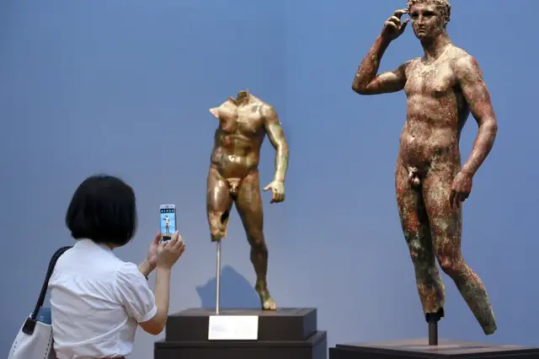
European Court Upholds Italy's Right to Seize Greek Bronze from Getty Museum
A European court on Thursday upheld Italy’s right to seize a prized Greek statue from the J. Paul Getty Museum in California, ruling that Italy was justified in trying to reclaim an important part of its cultural heritage and rejecting the museum’s appeal.
The European Court of Human Rights, or ECHR, determined that Italy’s decades-long efforts to recover the “Victorious Youth” statue from the Malibu-based Getty were not disproportionate.
“Victorious Youth,” a life-sized bronze dating from 300 B.C. to 100 B.C., is one of the highlights of the Getty’s collection. Though the artist is unknown, some scholars believe it was made by Lysippos, Alexander the Great’s personal sculptor.
The bronze, which was pulled from the sea in 1964 by Italian fishermen and then exported out of Italy illegally, was purchased by the Getty in 1977 for $4 million and has been on display there ever since.
The Getty had appealed to the European court after Italy’s high Court of Cassation in 2018 upheld a lower court’s confiscation order. The Getty had argued that its rights to the statue, under a European human rights protocol on protection of property, had been violated by Italy’s campaign to get it back.
The court ruled Thursday that no such violation had occurred.
“This is not just a victory for the Italian government. It’s a victory for culture,” said Maurizio Fiorilli, who as an Italian government attorney had spearheaded Italy’s efforts to recover its looted antiquities and, in particular, the Getty bronze.
The Getty has long defended its right to the statue, saying Italy had no legal claim to it.
Among other things, the Getty had argued that the statue is of Greek origin, was found in international waters and was never part of Italy’s cultural heritage. It cited a 1968 Court of Cassation ruling that found no evidence that the statue belonged to Italy.
Italy argued the statue was indeed part of its own cultural heritage, that it was brought to shore by Italians aboard an Italian-flagged ship and was exported illegally, without any customs declarations or payments.
After years of further legal wrangling, an Italian court in Pesaro in 2010 ordered the statue seized and returned, at the height of Italy’s campaign to recover antiquities looted from its territory and sold to museums and private collectors around the globe.
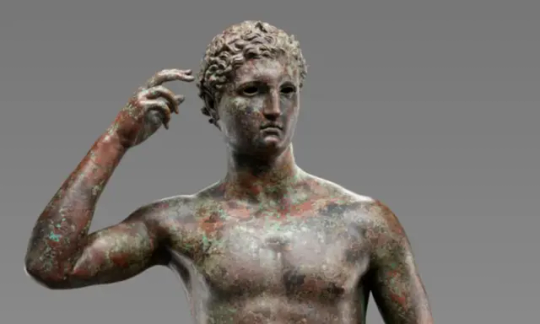
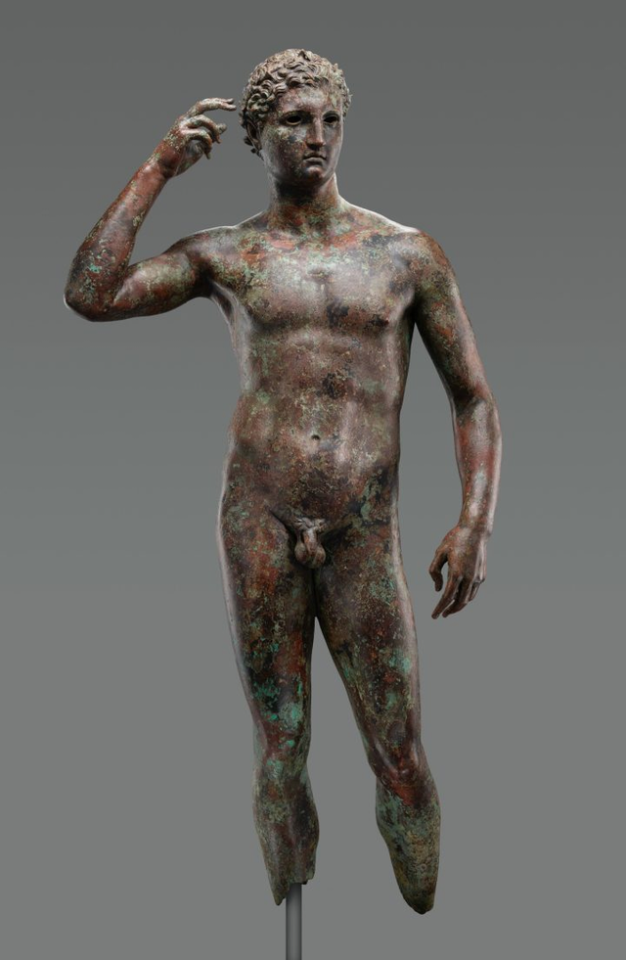
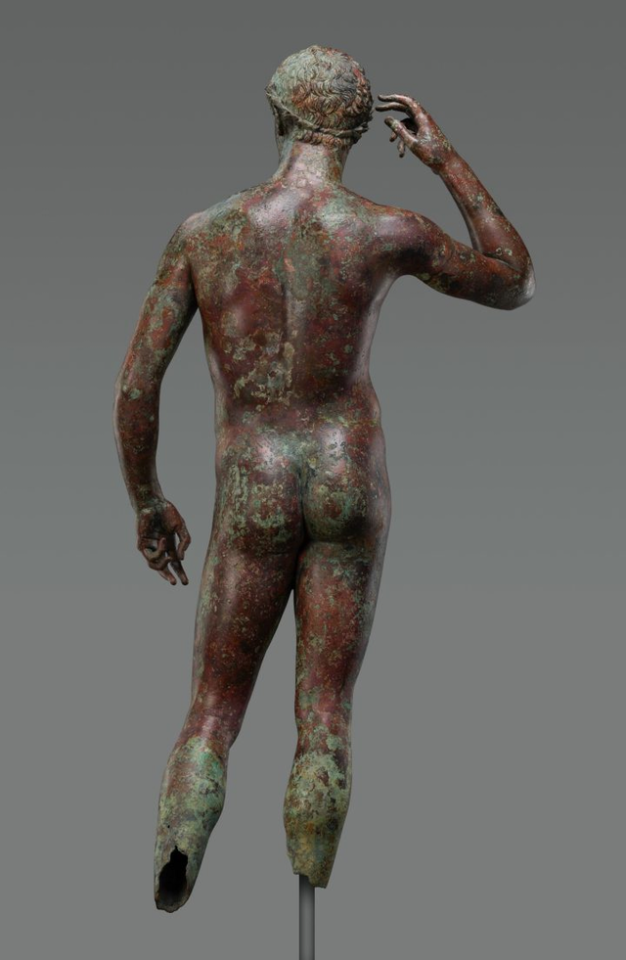
Thursday’s ruling by the Strasbourg, France-based ECHR was a chamber judgment. Both sides now have three months to ask that the case be heard by the court’s Grand Chamber for a final decision. But Thursday’s ruling was unanimous, with no dissenting judges, and the Grand Chamber can refuse to hear the case.
There was no immediate comment from the Getty, and its lawyers referred comment to the museum.
Italian Culture Minister Gennaro Sangiuliano praised Thursday’s decision as an “unequivocal ruling” that recognized the rights of the Italian state and its ownership of the statue.
“Following today’s ruling … the Italian government will restart contacts with U.S. authorities for assistance in the implementation of the confiscation order,” he said.
In a statement, he doubled down on Italy’s campaign to bring its looted treasures home, and noted that recently Italy has ceased cooperation with foreign museums that don’t recognize Italian legal confiscation orders.
Recently, Italy banned any loans to the Minneapolis Institute of Art following a dispute over an ancient marble statue believed to have been looted from Italy almost a half-century ago.
The Getty had appealed to the ECHR by arguing, among other things, that Italy’s 2010 confiscation order constituted a violation of its right to enjoy its possessions and that it would be deprived of that right if U.S. authorities carried out the seizure.
The ECHR however strongly reaffirmed Italy’s right to pursue the protection of its cultural heritage, especially from unlawful exportation.
“The court further held that owing, in particular, to the Getty Trust’s negligence or bad faith in purchasing the statue despite being aware of the claims of the Italian state and their efforts to recover it, the confiscation order had been proportionate to the aim of ensuring the return of an object that was part of Italy’s cultural heritage,” said the summary of the ruling.
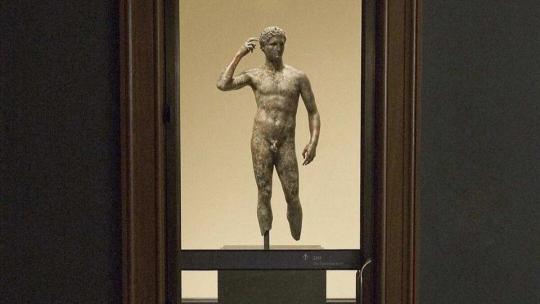
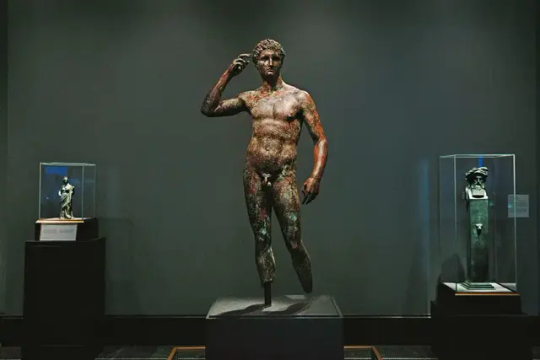
It wasn’t immediately clear what would happen next, though Fiorilli said the Getty had exhausted legal remedies and it’s now for U.S. the courts to enforce the Italian confiscation order.
“It’s not about guaranteeing the right to property, it’s about guaranteeing the internationally recognized value of every nation’s right to protect its cultural patrimony,” Fiorilli told The Associated Press over the telephone.
The statue, nicknamed the “Getty Bronze,” is a signature piece for the museum. Standing about 5 feet (1.52 meters) tall, the statue of the young athlete raising his right hand to an olive wreath crown around his head is one of the few life-sized Greek bronzes to have survived.
The bronze is believed to have sunk with the ship that was carrying it to Italy after the Romans conquered Greece. After being found in the nets of Italian fishermen trawling in international waters in 1964, it was allegedly buried in an Italian cabbage patch and hidden in a priest’s bathtub before it was taken out of the country.
Italy has successfully won back thousands of artifacts from museums, collections and private owners around the world that it says were looted or stolen from the country illegally, and recently opened a museum to house them until they can be returned to the regions from where they were looted.
The most important work to date that Italy has successfully brought back is the Euphronios Krater, one of the finest ancient Greek vases in existence. The Metropolitan Museum of Art in New York, which purchased it for $1 million in 1972 from an art dealer later accused of acquiring looted artifacts, returned it to Italy in 2008.
In 2010, the same year that Italy ordered the “Victorious Youth” statue confiscated from the Getty, a criminal trial ended in Rome against the Getty’s former curator of antiquities, Marion True. After years of trial, the Rome court ruled that the statute of limitations had expired on charges that True received stolen artifacts. She has denied wrongdoing.
In 2007, the Getty, without admitting any wrongdoing, agreed to return 40 ancient treasures in exchange for the long-term loans of other artifacts. Similar deals have been reached with other museums.
Under the 2007 deal, the two sides agreed to postpone further discussion of “Victorious Youth” until the court case was decided.
By Nicole Winfield.
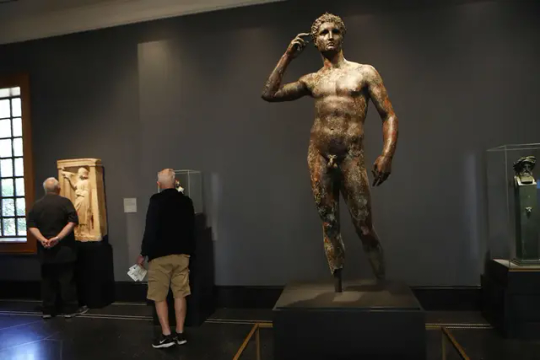
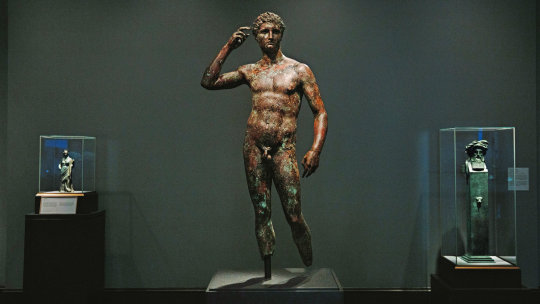
#European Court Upholds Italy's Right to Seize Greek Bronze from Getty Museum#J. Paul Getty Museum#bronze#bronze statue#bronze sculpture#getty bronze#Victorious Youth#ancient artifacts#archeology#archeolgst#history#history news#ancient history#ancient culture#ancient civilizations#ancient greece#greek history#greek art#ancient art#stolen art#looted art
100 notes
·
View notes
Text


The Restoration of the Roman Republic ... in the Middle Ages? The Forgotten Commune of Rome
Today it seems men often have Rome on their minds with Tik Toks and polls indicating that men often think about Rome on a daily basis. I'm assuming that most of these thoughts revolve around the Roman Empire, lesser so the Roman republic, some the Eastern Roman (Byzantine Empire), and few think about the Roman monarchy. However I guarantee that almost no one thinks about the medieval Roman Republic known as the Commune of Rome.
In the 12th century central Italy was directly ruled by the Pope through the Papal States. One of the hot topic political issues of the day was the "investiture controversy", which was debate over who had the power to install bishops and other important clergy; the Pope or secular authorities. This evolved into a debate on who would have ultimate governing authority, the Pope, or the secular government, most notably the Holy Roman Empire. At the time, many cities in Italy were growing disgruntled with the rule of the Pope and the rule of nobles who supported the Pope. This resulted in popular uprisings in which cities overthrew the Papal government and declared themselves independent, thus forming various city states and communes in Italy.
In 1143 a wealthy Italian banker named Geordano Pierlione led a revolt against Papal authority, kicking the Pope out of Rome and declaring an independent Commune of Rome. The next year a monk and priest named Arnold of Brescia arrived in the city, becoming the intellectual leader of the movement and establishing the new Roman Republic. Arnold was a controversial reformer who railed against abuses of Church and Papal authority, decried Church corruption, and advocated a thorough reformation of the Church. Among his ideas he believed that clergy needed to return to apostolic poverty, renouncing all wealth and ownership of property, and also renouncing secular political power. Here's a statue of him in Brescia, Italy today.

With Arnold at it's head a new Roman government was formed and modeled after the ancient Roman Republic, with 56 senators who were not of noble class, 4 from each of Rome's medieval districts, and executive authority invested in a "patrician". The new republic refused to use the title "consul" as it had become an inherited noble title after the fall of the Western Roman Empire. Nobles and aristocrats above the rank of knight were not allowed and thus most noble titles were abolished.
Of course the Pope, then Lucius II, was not going to tolerate such a rebellion and attempted to take back the city. In 1145 he formed an army and laid siege to the city. Amazingly the Romans drove away the invaders, with Pope Lucius II being killed in the battle after being bonked in the head with a rock.
The new republic flourished; drafting news laws, reforming medieval Roman society, making alliances with other Italian city states and war with others, setting up courts, and minting coins.
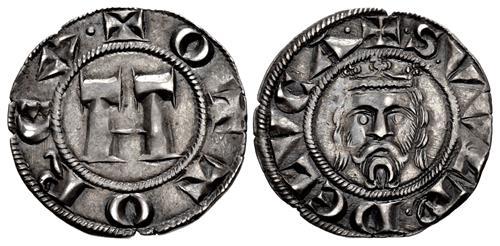
The Roman army was reformed, and a new capital building was constructed on the Capitoline Hill known as the Palazzo Senatorio (the Senate Palace), which still stands today but is much different after being heavily renovated by Michelangelo in the 1530's.
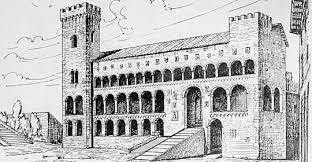
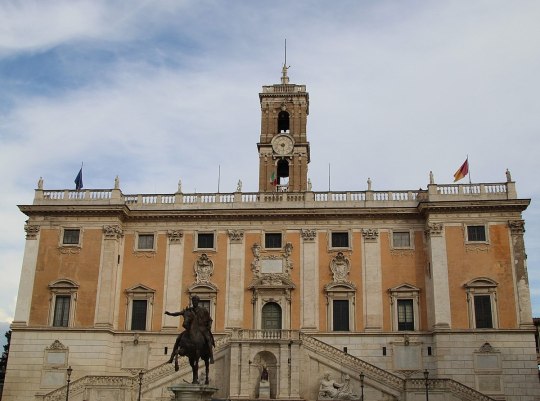
Originally the new Roman Republic swore fealty to the Holy Roman Emperor. However Rome and the Empire had a falling out. In 1149 the Roman Senate invited the German king Conrad III to the city to be coronated Roman Emperor. Rome's enemies were growing, so the Roman Senate offered Conrad this title in return for protection. Conrad had already been elected as Holy Roman Emperor and was due to be coronated, but the Roman Senate was proposing that he be THE Roman Emperor, as in like, a real Roman Emperor whose authority is defined by the Roman Senate, and not a Holy Roman Emperor whose authority was defined by the Pope and a loose confederation of high ranking German, Italian, Austrian, and Czech nobles. In the Holy Roman Empire the emperor is elected by the highest ranking nobles of the land. The Roman Senate was claiming that it had the authority to choose Roman emperors as the senate did during the ancient Roman Empire. Well, lets just say that Conrad probably didn't take too kindly to the Roman Senate attempting to usurp the governing structure of the Holy Roman Empire. In the middle ages a group of lower class burghers and knights cosplaying as Roman senators was not a good basis for a Europe spanning universal imperial monarchy. When Conrad died he was already cutting a deal with the Pope to snuff out the republic.
Conrad died in 1152 but his successor, Frederick Barbarossa continued the deal with the Pope to end the Roman Republic. It was one of the few times Frederick and the Pope agreed on anything. In 1155 a combined Papal/Imperial army invaded Rome. The city quickly fell and Arnold of Brescia was captured and burned at the stake. His ashes were scattered into the Tiber River.
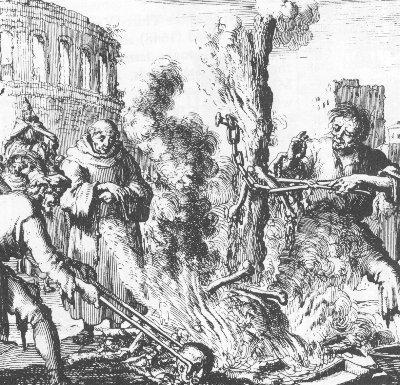
Amazingly the Roman Republic lived on. Frederick Barbarossa was coronated by Pope Adrian IV as Holy Roman Emperor, an act which led to a new revolt among the Romans. Frederick put down this revolt, killing 1,000 Romans in the process, but afterwards he simply left the city and never returned after becoming bogged down in the complex politics of Italy. The Pope also left Rome, having to deal with a papal schism, resulting in no one being left in charge of the city and thus another restoration of the Roman Republic.
In 1167 Rome made war on the neighboring city of Tusculum, a long time rival of Rome who had supported the Pope and became a papal capital after the foundation of the republic. The Count of Tusculum appealed for help to the Holy Roman Empire, and Frederick I sent a small army of 1600 men. The Romans had an army of 10,000 made up of peasant militia who were poorly armed and poorly trained. While heavily outnumbered the Imperial army consisted of well armed and trained knights and professional soldiers. The Imperial army easily defeated the Romans at the Battle of Monte Porizio on May 29th, 1167, a battle which would later be called, "the Cannae of the Middle Ages". The Imperial army would continue to march on Rome, but by a stroke of luck for the Romans would be struck with the plague and forced to turn back. The Romans got their revenge against Tusculum in 1183 when they conquered and burned the city to the ground Carthage style.
The beginning of the end of the republic came in 1188 when Pope Clement III made a power sharing deal with the senate in which the people would elect senators but the Pope would have to approve the senators. The senate agreed to this in order to secure the protection of the Pope as the Holy Roman Empire was still a threat. Over the coming decades popes would reduce the number of senators until by the early 13th century, there was just one. Soon that single senate post was directly chosen by the Pope, and eventually it became a hereditary position. Before you knew it, French and Spanish nobles were becoming Roman senators and Roman senators ruled as autocrats at the behest of the Pope. By the end of the 13th century, the Roman Republic was dead.

214 notes
·
View notes
Text
The Haas and Uralkali situation explained
Some of you might’ve heard of it, those that didn’t should now. In the course of this race weekend, news came out that equipment and the cars of the Haas F1 team could be seized, as they owe their former sponsor Uralkali money, and as long as they don’t repay that money, their assets, in this case cars and equipment could be seized. All of this could lead to them missing the Italian Grand Prix, if not more, but what exactly happened and what will Haas do now? I’ll try to answer these questions and give my opinion on the situation, but i’ll preface all of this by saying that I am not legally involved in any of this, which means I can also only give you public knowledge and while i tried my hardest to research all the facts, it’s impossible to be sure that everything is correct, but more to that later.
Back to the problem; where did all of this start?
Uralkali ‘is a Russian potash fertilizer producer and exporter’ as stated on Wikipedia. It’s a pretty big company with a lot of assets, in 2018, they had assets worth roughly $8 billion. With these big numbers in mind, Uralkali became a sponsor of Haas in 2021. I’ll make a separate post about sponsors, but important to know for this is that sponsors hold contracts with the teams. They give the teams money that's needed and in return, depending on how much they gave, they get things back from the team. As you’ve probably guessed, Uralkali gave quite a big sum of money to Haas, they became title sponsor, so for 2021, Haas was officially called ‘Uralkali Haas F1 team’, their cars livery was in the russian flag and they signed Nikita Mazepin, son of Dmitry Mazepin who’s one of the most influential Uralkali shareholders. It’s not quite clear how much money Haas got, but multiple sources talk about roughly $12 million, which makes sense if you take all factors into account.
From the money Haas made, they bought equipment and parts for the cars, so as far as sources state, all the money they initially got has been used up.
In 2022, following Russia's invasion of the Ukraine, many business people and oligarchs were sanctioned. I could not find clear statements of Uralkali itself being sanctioned too, but considering that most of the owners and shareholders are, I would assume that that puts the company also under certain sanctions. The important part here is that both Nikita and Dmitry Mazepin have been put under sanctions. These sanctions consist of asset freezes and travel bans, which resulted in Nikita Mazepins contract and the sponsoring contract being terminated by the team.
Now this is where the problem starts; by contract, there's usually a clause that does not allow one party of the deal to just withdraw, at least not without paying their shares back. Due to the sanctions, though, it was not possible for Haas to pay the money that they owed back.
According to multiple sources, there was an arbitration court hearing in June in Switzerland, in which the court ruled that Haas needs to pay back the money that they owe Uralkali. Again, different sources talk about different amounts of money, since the ruling was kept private, but Uralkali states that by contract, they are also owed "a team race car from the 2021 season”. It’s difficult to rule out what really happened as different sources state different things, but they all have in common that Haas did not meet the required time to pay back whatever they owe, may that be because of the sanctions or because they lack the money, the important point is, Uralkali proceeded with a bid to get their court ruled money in assets. This race weekend, Haas has been apparently visited by bailiffs to evaluate what assets are of what value that could then be owed to Uralkali.
All of this is pretty irrelevant to the dutch grand prix, as it has been made sure that the valuation and official proceedings do not happen during the day and Haas has been ensured that this race weekend would continue, this could change though for the italian grand prix. If bailiffs decide which assets are worth the amount they owe Uralkali, these could be kept in the Netherlands until Haas pays or be taken as substitute for the money, although I am not sure where the legalities would lie there with what Uralkali is allowed to do with the assets then.
The big problem for Haas right now, is paying. It's unclear if Haas has the money to pay it back, if they do it would obviously be a big setback because we are talking about millions of dollars here, but there is another problem; due to the sanctions, Haas states, the process of paying is difficult; “Haas has been working with its lawyers to ensure payment will comply with all relevant US, EU, UK and Swiss sanctions and regulations.” Uralkali states that this is not a good reasoning, but politics are difficult to follow, so even with extensive research I cannot guarantee you that paying is even a possibility without breaking sanctions by certain countries. For Haas the problem stays; they need to pay before Monday, or their assets will not be allowed to leave the Netherlands.
Due to this, rumors have surfaced, saying that this could be the end of Haas. Even if they pay the money and can compete in Italy, a lot of people expect it to be the final hit for Haas and possibly result in the team leaving or being bought up by Andretti, an American company that has tried to get into F1 for a while now. As of now, i cannot answer these rumors based on proof, but i can share my thoughts; leaving the sport completely is not as easy as it seems, there are contracts and rules, depending on the contracts, just leaving could cost Haas even more. Although selling the team would bypass these rules, selling a team takes time. Andretti could benefit from Haas being cheaper to buy than it would usually be, if the owners want to leave they’ll want to do it fast and for a team like Haas, you really cannot ask for much. In the end I do think though, that the rumors are unwarranted. If Haas gets sold, it's because they got a good offer, not because they suddenly want to leave when things get hard, especially since things were never easy at Haas to begin with.
I hope I explained and summarized the whole situation properly. As always, I'm open to explain my thoughts further and for comments and what you guys think of the situation and in this case rumors.
#haas f1 team#f1#formula 1#f1 2024#dutch gp 2024#nico hulkenberg#kevin magnussen#nikita mazepin#lewis hamilton#max verstappen#charles leclerc#carlos sainz#oscar piastri#wheeltalk
42 notes
·
View notes
Note
hewwo ma amie !! i came as stated cus bourbon - habsburg infodump exchange
I would actually want a presentation about mariana de austria ... im a loser who doesnt know much about her ! i read about her when she got to spain and was confused about spanish (that was so real from her) but i dont know more cool stuff about her at all ... so feel free to tell me anything you find remarkable about her !
who is your favourite bourbon ? :3
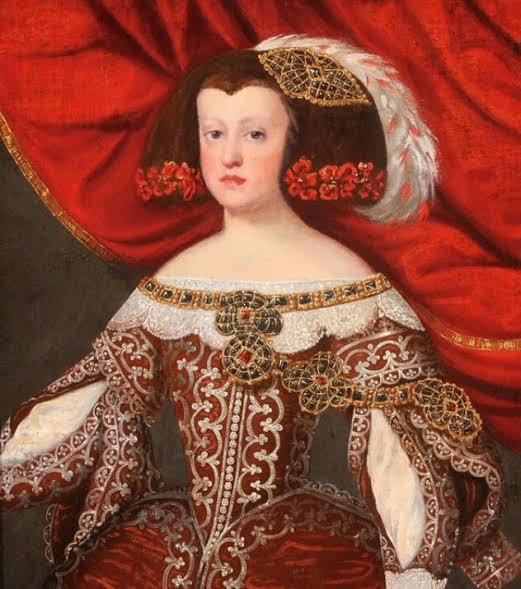
Thank you for this Question:
Queen Mariana of Austria is known as the Mother of Charles II of Spain and the niece/wife of Philip IV. She was Queen Regent when her husband Philip IV died and ruled on Carlos II's behalf until he was 14. Like Charles II, Queen Mariana was a victim of the classic “decline of Spain” paradigm. She is defined by 19th-century historians as “weak,” “unstable,” and “ignorant” but also “Machiavellian,” “scheming,” “with a German outlook” (meaning foreign), at times “melancholic” because she suffered from migraines, and was overly pious and uninterested in politics because she “dressed as a nun." She was accused of handing power over to her favorites; Jose Everardo Nithard and Fernando de Valenzuela. In reality, She was smart, strategic, strong, decisive, and seemingly tactile. Her favorites played a dominant role in her regency but her strong and decisive personality and her extensive and consistent participation in all aspects of government suggest otherwise. She faced two political crises during her regency the first was in 1669 resolved by her dismissal of Nithard; the second, between 1675 and 1677, ended with Valenzuela’s fall and her exile. There is evidence in state papers to prove that she did not surrender power to them. Speaking of Jose Everardo Nithard, He was Mariana's tutor, friend, and later her confessor. He was made inquisitor General. As for Valenzuela, Known as the palace elf, due to his influence and connections to people in high places. He married a woman who is part the queens valet. He provided Queen Mariana information about gossip and rumors that were circulating in Madrid. Valenzuela got more influencial overtime which created tension between him and the court. He was Mariana's protégé. Their friendship caused controversy and nasty rumors where made about them as a result. The worst one I believe was the rumor of Queen Mariana sleeping with Valenzuela. The fact that people actually believe that rumor makes me angry. Mariana was dressed as a nun because this is the type of dress worn by Habsburg widows. She made a few changes to the garb like having princely folds and lavish materials. Queen Mariana was exposed to the Spanish cultural traditions because Mariana's mother is Philip IV's sister. She was exposed to Italian culture because of two generations of italian empresses. Mariana both observed and participated in court ballets, rituals, and ceremonies; her dance master, Santo Ventura, was highly regarded. Boys received this kind of instruction as well. Leopold I, for example, was an avid consumer and practitioner of theater and music as emperor. At the age of seven, for example, Mariana publicly greeted her parents on their return from the Diet of Regensburg in 1641 by saluting her mother in the Spanish style and her father in Latin. When the fourteen-year-old performed a similar greeting in Trento, this time as queen of Spain, she had had at least seven years of practice. Queen Mariana was educated and spoke Latin, Spanish and German well. Judging by her education and her fleunt spanish, I doubt she struggled speaking spanish. I read somewhere that Queen Mariana as a child loves playing with dolls. She was cheerful, obedient, and lively girl. Her marriage to King Philip IV of Spain was always described as a terrible marriage because King Philip "cheated" on her, their different personalities, and massive age gap. In reality, They had an affectionate relationship and King Philip was loyal throughout their marriage. He described himself as a change man and would give Mariana everything she wanted. They did struggle financially though and at times could get caught in a series of arguments. I mean no marriage is perfect.
Gossip writer Barrioneuvo reports that one day The Queen asked for pastries and commented that she was not served for some days. She was told that the pastry cook would not supply the palace until a large outstanding bill had been paid. She removed a ring from her finger and ordered a servant to exchange it for pastries; Manuelillo de Gante told her to put the ring back on and gave the servant a copper to buy some tarts so that the Queen can finish her dinner.
Queen Mariana was the woman behind Castillio De San Marco, After a pirate attack in June 1668 roused Mariana into action. Queen Mariana was horrified receiving this news because the attack was so brutal. On March 11, 1669, the queen regent issued her decree ordering the viceroy of New Spain to send subsidies to the city. She also added funding for the building of a masonry fortification and additional soldiers. To oversee the project, she sent Don Manuel de Cendoya to St. Augustine as the new royal governor. Her judgement protected and spurred the city’s growth over the following decades. This growth even led to a later governor requesting the same regent queen for a new two-story, coquina Governor’s House in St. Augustine.
Mariana was a good mother-in-law to Marie Louise of Orleans. After the wedding of Marie Louise, Carlos introduced Marie Louise. Marie Louise bowed to her but Queen Mariana grabbed her hands and told her to stand; and said "Call me mother" with a smile.
Mariana in the year 1696 felt pain in her breast turns out she had breast cancer and she tries her best to hide it because she did not want Maria Anna of Nueburg to take over. The pain was unbearable that she asked the doctors to check her breast. When they examined the Queen they found a huge tumor in her breast. Their is no treatment for this and she was offered relics and prayers. When she died.
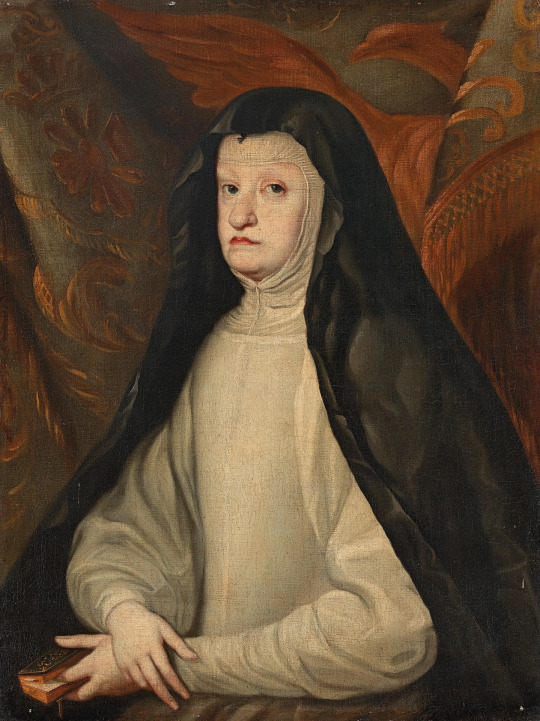
Reports of miracles attributed to her quickly began to circulate. These miracles and her body’s reported “incorruptibility” three years after her death led to a beatification proceeding in the last years of Carlos’s reign. Mariana’s path to sainthood, however, came to an abrupt end when the new dynasty, the Bourbons, took power. Both the beatification proceedings in 1698 and its abandonment in 1702 were as politically motivated as everything else in her life had been
I won't give too much information on her regency because there is a book about it called Queen, Mother, and Stateswoman Mariana of Austria and the government of Spain by Silvia Z. Mitchell. This book is my source about her and the reason why I made this blog so her side of the story will be known. Other sources are from https://governorshouselibrary.wordpress.com/2022/09/22/mariana-de-austria-the-queen-behind-the-castillo-de-san-marcos/?fbclid=IwY2xjawE5D5UBHUpP8HVhtFboR9ZThC2j5LNDLj531pKjmVxtGQbf7A2yMOo2AuNxqEU3Qw
youtube
I like 4 bourbons, Philip V, Luis I, Fernando VI, and Carlos III. If I had to choose one it would be Carlos III because he modernized Spain and imposed great reforms.
Sorry I took so long to reply
#mariana de austria#history#spain#habsburg#house of habsburg#I hate 19th century propaganda#charles ii of spain#carlos ii#justice for mariana de austria#Carlos imposed laws to protect natives and Mariana funded the Castillo de San Marco project#i hate the fact that her brilliant efforts where forgotten#monarquía española#spanish monarchy#monarchy#her story#felipe iv#my queen#Queen mother and stateswoman#book#marianas trench
41 notes
·
View notes
Text
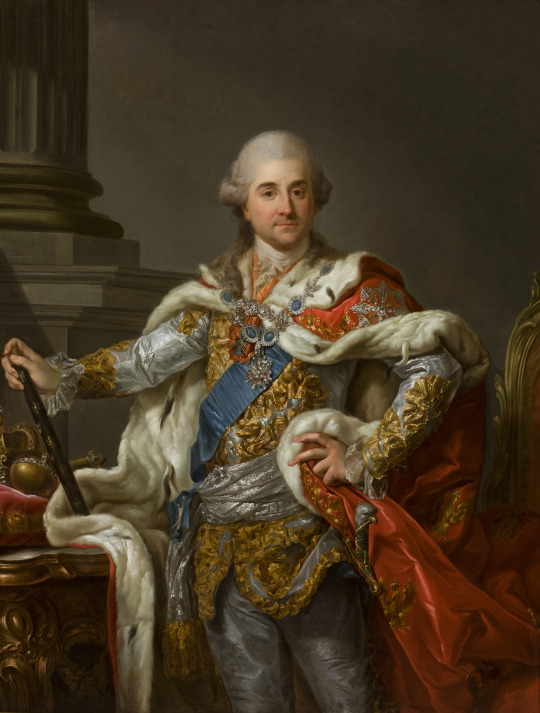
Portrait of Stanislaus Augustus Poniatowski in Coronation Robes
Artist: Marcello Bacciarelli (Polish-Italian, 1731–1818)
Date: c. 1790
Medium: Oil paint on canvas
Collection: National Museum in Krakow, Poland
Stanisław August Poniatowski
Stanisław August [Stanislaus Augustus] Poniatowski was elected king of Poland in 1764. Especially at the beginning of his reign, he was neither very popular with the nobility nor as influential as his rich family, the Czartoryski Familia. Therefore, he needed a formal portrait emphasizing the special significance of his person as the king of Poland and strengthening the conviction about the lawfulness of his rule, actually assumed with the considerable support of Russia. Moreover, European courts, for example in Vienna and Versailles, were interested in possessing a portrait of the new Polish king. The newly elected monarch sought a talented portraitist, familiar with the latest trends in Western European art, who would be able to paint a splendid formal portrait. He wished to entrust this task to Marcello Bacciarelli, an Italian painter who had stayed at the court of Augustus III the Saxon in Warsaw for several years, leaving in the country a large number of excellent portraits of aristocrats. The king did not want to be portrayed in armor, but in the formal dress that he was wearing during the coronation ceremony: a coat lined with ermine fur, decorated with Polish eagles, a frock coat and trousers, with his hand rested against the baton of the military commander and royal regalia lying on the table beside him. Taking the king's instructions into consideration, Bacciarelli painted the portrait following the en gala pattern dating back to the time of the French absolute rulers, but in the more recent Rococo style. The king's pose was light, refined, elegant and graceful, which was in tune with the fashion of the day. The monarch noted down in his diary that the portrait caught the best likeness of him.
#portrait#painting#oil on canvas#stanislaus augustus poniatowski#standing#coronation robes#three quarter length#classic pillar#stanislaus ii augustus#king of poland#grand duke of lithuania#polish monarchy#marcello bacchiarelli#italian painter#polish culture#polish history#artwork#fine art#european art#18th century painting
19 notes
·
View notes
Photo

Leo Africanus
Leo Africanus (al-Hasan ibn Muhammad ibn Ahmad al-Wazzan al-Fasi al-Granati, 1485-1554) was a diplomat, merchant traveller and scholar who famously voyaged from Timbuktu to the Niger River and wrote 'The History and Description of Africa' (La Descrittione dell'Africa, 1526). Captured by Mediterranean pirates, he so impressed them with his learning and linguistic ability, that they gifted him as a slave to Pope Leo X (1498 -1526).
Leo Africanus was born into a family of clerics and accountants to the court of the Nasrid Dynasty (1238-1492) of Granada during the last days of their rule over the Emirate of Granada. Hasan was baptised Johannes Leo Africanus, and known in Italian as Giovanni Leone. He trained as an Islamic scholar and became a diplomat, travelling across West Africa, from Cairo and Aswan across to the Hejaz and Syria. It was during his return journey from Egypt that he was kidnapped by Mediterranean Christian pirates and ended up becoming a slave to the Vatican Pope Leo X (born Giovanni de’ Medici). Pope Leo X offered Hasan his freedom on condition that he converted to Christianity.
Leo Africanus' scholarship and translations from Arabic inspired early modern ideas of Africa and the Islamic world. His work Descrittione dell'Africa became a blueprint for European explorers seeking to monopolise trade and resources from the African subcontinent. Some historians believe that William Shakespeare’s (1564-1616) Othello is based on Leo Africanus. Descrittione dell'Africa was widely read in Europe. It became an important resource and guidebook on Africa, until the European colonisation during the 19th century.
Hasan al-Wazzan
Hasan al-Wazzan’s father, Ahmad al-Wazzan was a cleric in the court of Abu Abdallah Muhammad XII (c. 1460–1533), known in Europe as Boabdil. Hasan’s forbearers worked as aids to the court muhtasib of Granada – a magistrate who oversaw merchant trade and accounts, while also upholding morality and decorum in the public sphere. Hasan grew up alongside his father and grandfather under the influence of the Nasrid court. As a child, he spoke Arabic at home and Spanish in the streets.
Leo Africanus as Shakespeare's Othello
Théodore Chassériau (Public Domain)
In 1492, after a decade long war, Boabdil surrendered Granada to the Spanish Catholic monarchs Isabella I of Castile (1451-1504) and Ferdinand II, King of Aragon (1452 –1516), marking the end of 700 years of Muslim rule. Hasan’s family may have left Granada before 1492, or they could have stayed until the Reconquista. Hasan was a young child when his family, like many Andalusian migrants, fled persecution under the new Christian monarchs, crossing the Mediterranean to settle in Fez. Luckily Hasan’s family was well connected thanks to his uncle, already settled in Fez, who was a diplomat to the Wattasid rulers, serving Sultan Muhammad al-Shaykh (1490-1557). Consequently, they secured a home in a prominent quarter of Fez. His father purchased land north of the Rif Mountains and rented a castle above Fez. Other emigrant families from Granada however struggled greatly in Fez and complained publicly.
Continue reading...
28 notes
·
View notes
Text
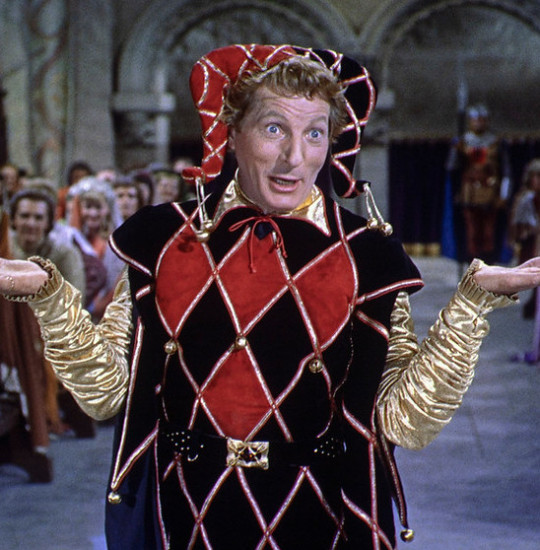

Danny Kaye (The Court Jester, The Inspector General)—Danny Kaye, idol of my childhood, maker of the weirdest faces! This man SETS HIMSELF ON FIRE and then puts himself out in a bucket in a movie based on a Gogol short story. In the same movie (Inspector General), he flirts by playing a carrot as a musical instrument. In Wonder Man, he's brilliant but struggles with things like riding buses. I have been envious of his fake Italian/French/German/Spanish monologues in The Court Jester for the past three decades. As Walter Mitty, he is SUPREMELY SILLY yet also somehow manages to be a comic foil for none other than Boris Karloff. All this is to say nothing of The William Tell Song (TV, thus not linked, but great.) I adore him.
Robert Helpmann (The Red Shoes, Chitty Chitty Bang Bang)—an extremely enticing combination of graceful and balletic and scrungly weirdo who looks kind of like if you put fred astaire and young boris karloff circa the black cat into the splicer machine from the fly. a literal actual ballet dancer, choreographer, shakespeare actor, and theater director, who left a mark on the psyches of many children as the terrifying child catcher in chitty chitty bang bang. undeniably scrungly but elegant and spidery in his scrungliness. in powell and pressburger's opera film tales of hoffmann he can be seen playing four different characters!
This is round 3 of the contest. All other polls in this bracket can be found here. If you’re confused on what a scrungle is, or any of the rules of the contest, click here.
[additional submitted propaganda + scrungly videos under the cut]
Danny Kaye:
He's so stupid. I love him.
youtube
Robert Helpmann:
In the interests of honesty i will say that I have only seen Robert Helpmann in Chitty Chitty Bang Bang , but honestly does it get weirder, scrunglier or more delightfully creepy than the Child Catcher? REALLY. He is so gracefully off-putting (and thereby utterly captivating). One of my very favourite aspects in one of my favorite chilhood movies. And ASIDE from the child catcher, just LOOK AT HIM!!!
youtube
I know we all know him from our childhood traumas from Chitty, but he was also an extremely talented dancer. you can see him here in the red shoes (he is the one who plays her lover).
youtube
86 notes
·
View notes
Text
Ways English borrowed words from Latin
Latin has been influencing English since before English existed!
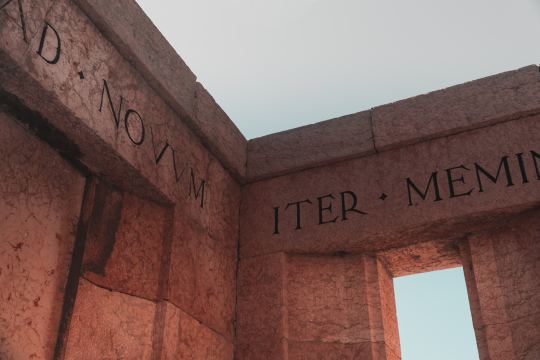
Here’s a non-exhaustive list of ways that English got vocabulary from Latin:
early Latin influence on the Germanic tribes: The Germanic tribes borrowed words from the Romans while still in continental Europe, before coming to England.
camp, wall, pit, street, mile, cheap, mint, wine, cheese, pillow, cup, linen, line, pepper, butter, onion, chalk, copper, dragon, peacock, pipe, bishop
Roman occupation of England: The Celts borrowed words from the Romans when the Romans invaded England, and the Anglo-Saxons later borrowed those Latin words from the Celts.
port, tower, -chester / -caster / -cester (place name suffix), mount
Christianization of the Anglo-Saxons: Roman missionaries to England converted the Anglo-Saxons to Christianity and brought Latin with them.
altar, angel, anthem, candle, disciple, litany, martyr, mass, noon, nun, offer, organ, palm, relic, rule, shrine, temple, tunic, cap, sock, purple, chest, mat, sack, school, master, fever, circle, talent
Norman Conquest: The Norman French invaded England in 1066 under William the Conqueror, making Norman French the language of the state. Many words were borrowed from French, which had evolved out of Latin.
noble, servant, messenger, feast, story, government, state, empire, royal, authority, tyrant, court, council, parliament, assembly, record, tax, subject, public, liberty, office, warden, peer, sir, madam, mistress, slave, religion, confession, prayer, lesson, novice, creator, saint, miracle, faith, temptation, charity, pity, obedience, justice, equity, judgment, plea, bill, panel, evidence, proof, sentence, award, fine, prison, punishment, plead, blame, arrest, judge, banish, property, arson, heir, defense, army, navy, peace, enemy, battle, combat, banner, havoc, fashion, robe, button, boots, luxury, blue, brown, jewel, crystal, taste, toast, cream, sugar, salad, lettuce, herb, mustard, cinnamon, nutmeg, roast, boil, stew, fry, curtain, couch, screen, lamp, blanket, dance, music, labor, fool, sculpture, beauty, color, image, tone, poet, romance, title, story, pen, chapter, medicine, pain, stomach, plague, poison
The Renaissance: The intense focus on writings from classical antiquity during the Renaissance led to the borrowing of numerous words directly from Latin.
atmosphere, disability, halo, agile, appropriate, expensive, external, habitual, impersonal, adapt, alienate, benefit, consolidate, disregard, erupt, exist, extinguish, harass, meditate
The Scientific Revolution: The need for new technical and scientific terms led to many neoclassical compounds formed from Classical Greek and Latin elements, or new uses of Latin prefixes.
automobile, transcontinental, transformer, prehistoric, preview, prequel, subtitle, deflate, component, data, experiment, formula, nucleus, ratio, structure
Not to mention most borrowings from other Romance languages, such as Spanish or Italian, which also evolved from Latin.
Further Reading: A history of the English language (Baugh & Cable)
160 notes
·
View notes
Text
✨My Favourite Moments of 2024!✨
uk prime minister keir starmer resigns in disgrace after accidentally referring to a trans woman by her correct pronouns
elon musk attempts to prove the safety of the tesla truck by letting mitch mcconnell drive. both men die within seconds of entering the vehicle
in response to worldwide famine, the World Food Programme appoints taylor swift as its director-for-life
the IDF continues carpetbombing occupied gaza after the ghosts of hamas are spotted. all gazans are required to evacuate into a shallow grave
the conclave repeatedly fails to elect a new pope, causing a schism. one conclave elects some italian bishop you’ve never heard of while the other conclave elects agent Q
the IMF buys pakistan
donald trump wins the republican primary carrying 60 states, 14 countries, and 8 circles of hell. during his victory broadcast from prison he suffers what it clinically described as a MegaStroke, removing his ability to move and speak. he declares one of his busty nurses to be his running mate and leads biden by 30 points
following the death of musk twitter is divided by gavelkind amongst multiple rival warlords
joe biden finally finishes his 13th genocide, winning a bet he made with obama
after it retreats from ukraine and georgia, putin personally murders every single member of the russian army. he is reelected in a landslide
his holiness the ayatollah ali khamenei dies peacefully of old age surrounded by his loving family and a grieving nation. days later he is found in a disused oil pipeline hiding from protesters while off his tits on heroin, and is dragged through the streets and beaten to death
the largest war in human history erupts in africa, costing dozens of millions of lives. it is a slow news day at the UN
president millei attaches argentina to the dollar. the us economy immediately crashes and undergoes apocalyptic hyperinflation, the dollar becoming the first currency to have a negative value. the only surviving american industry is joe biden ‘i did that’ stickers
the PLA begins its amphibious invasion of taiwan. the war claims the lives of one million PLA soldiers, ending within 20 minutes when the generals learn that tanks can’t swim
donald trump wins the us presidential election carrying all 100 states. during his victory broadcast from the intensive care unit, he suffers what is clinically described as a Heart Apocalypse, rupturing every single artery in his body and leaving him as pile of blood and gore. the supreme court rules that despite being, quote, “the most dead person ever recorded”, he is still eligible to be president. he and vp-elect Busty Nurse will be inaugurated on 20 january
due to a weird loophole, elon musk’s trans daughter inherits his entire estate. she immediately uses all her wealth to found a mutually-owned food distribution network, ending world hunger
the switch 2 still doesn’t have fucking analogue triggers
105 notes
·
View notes